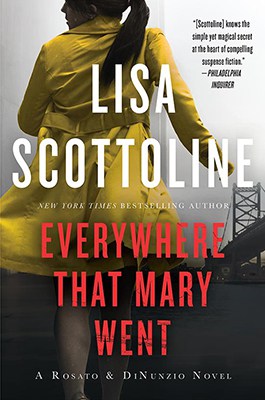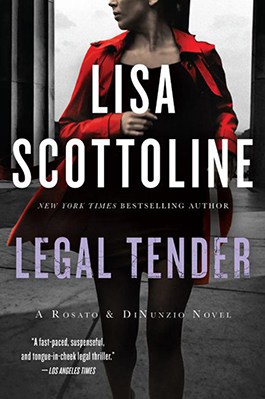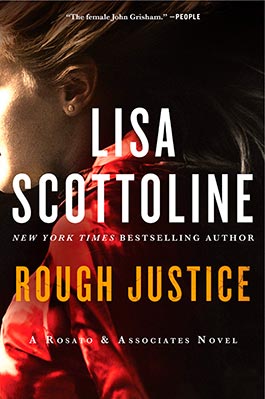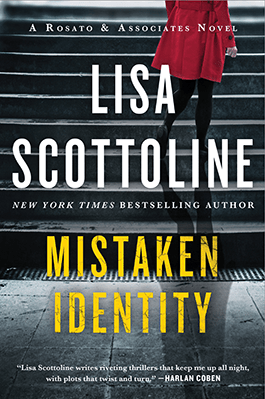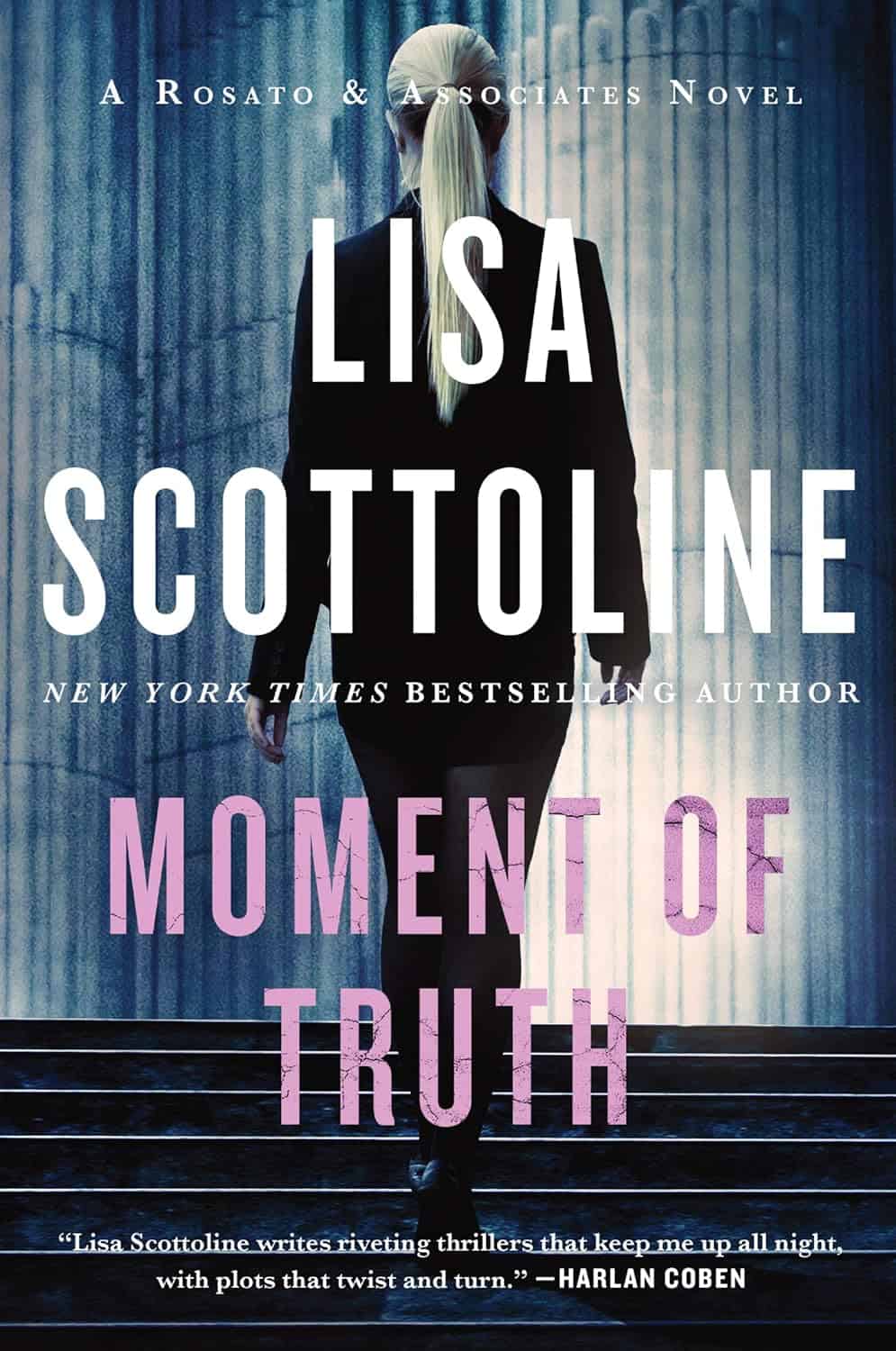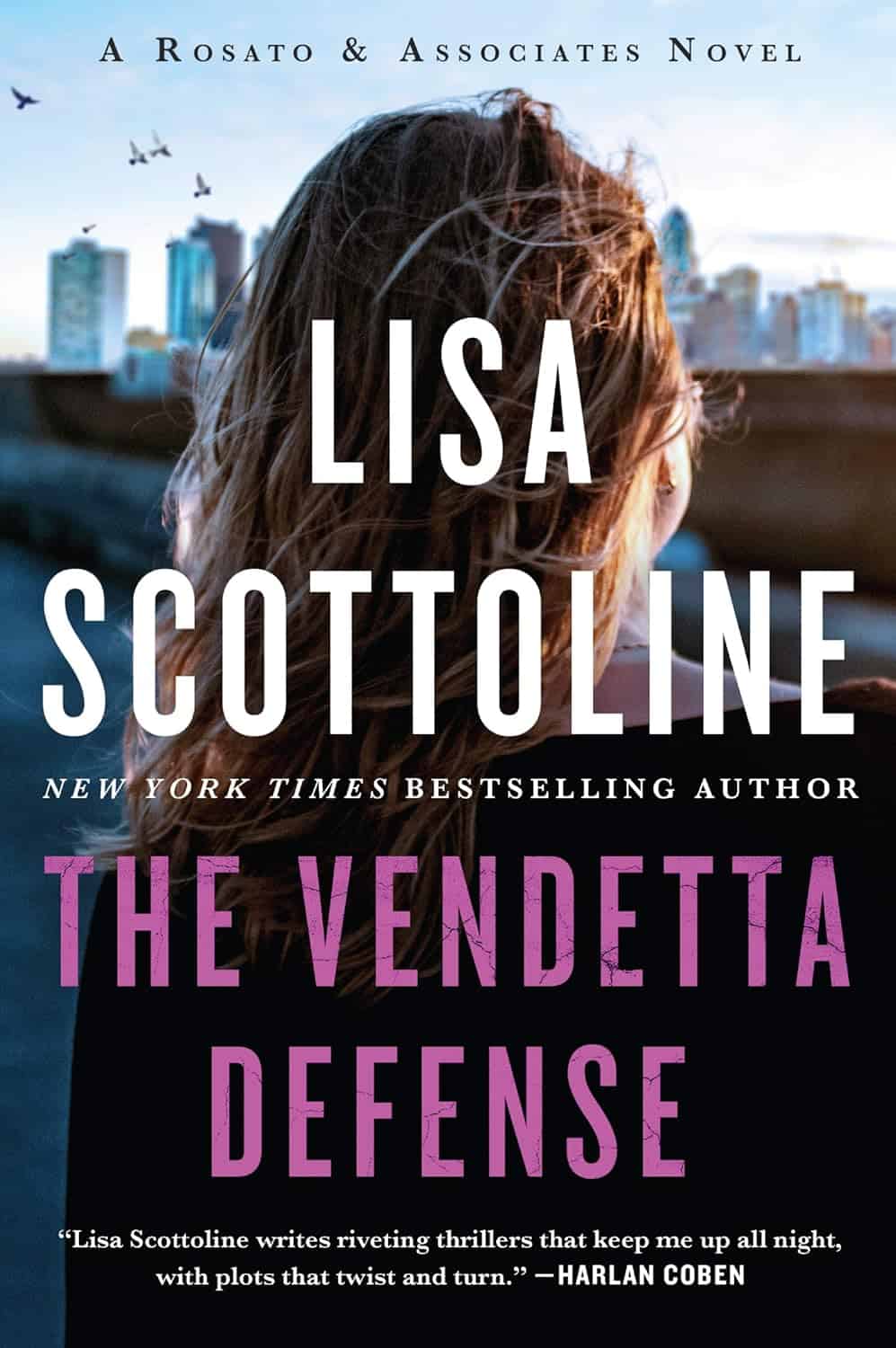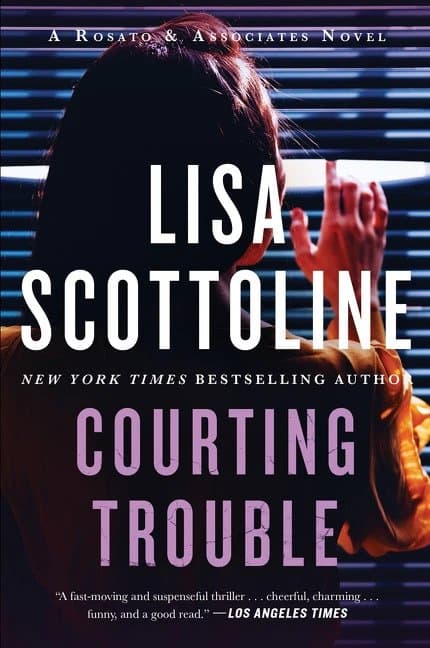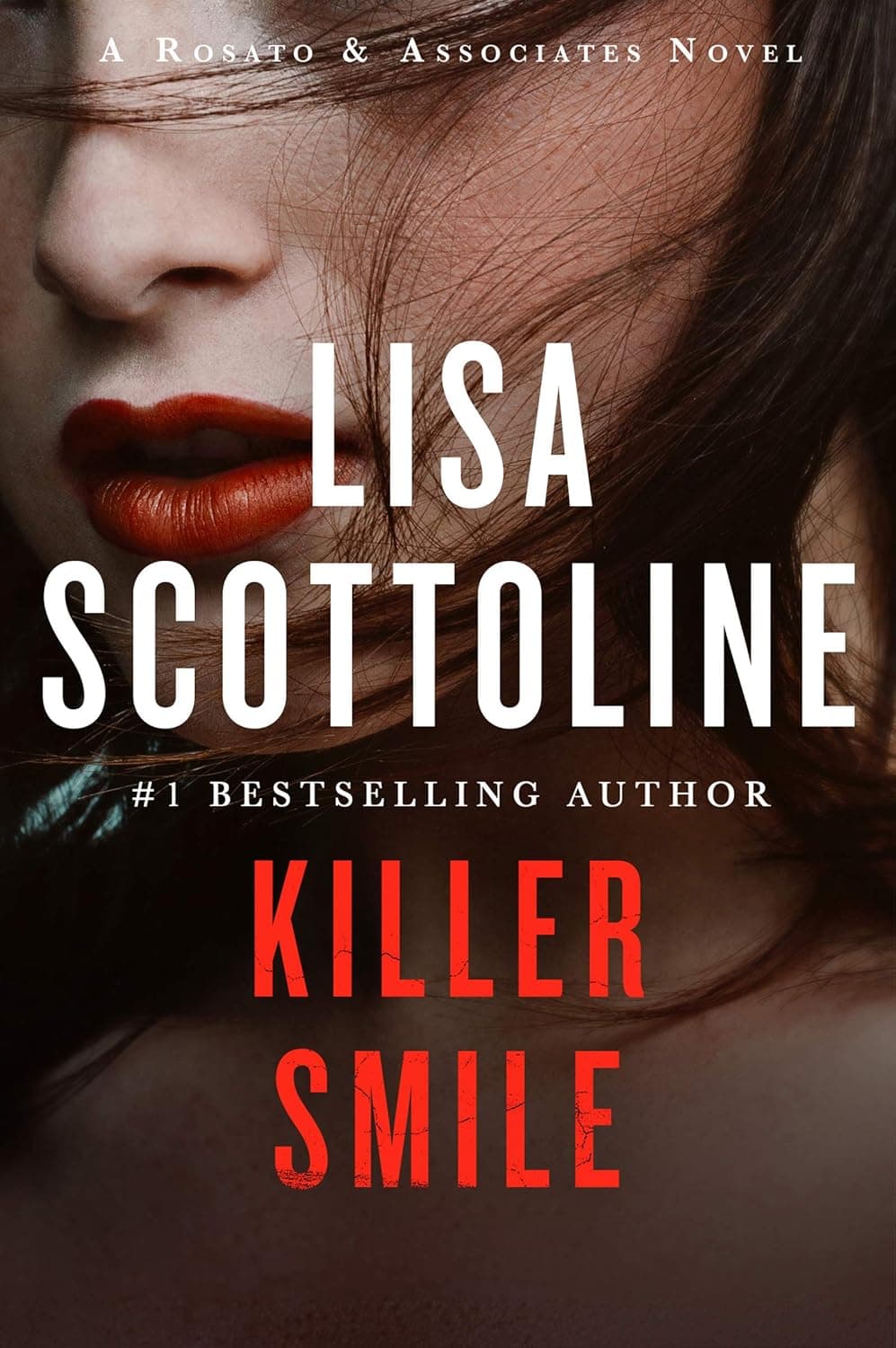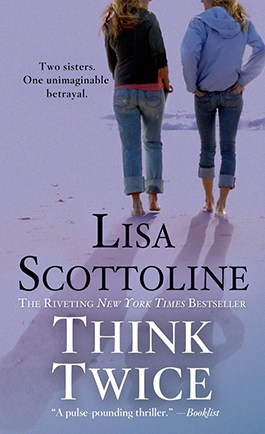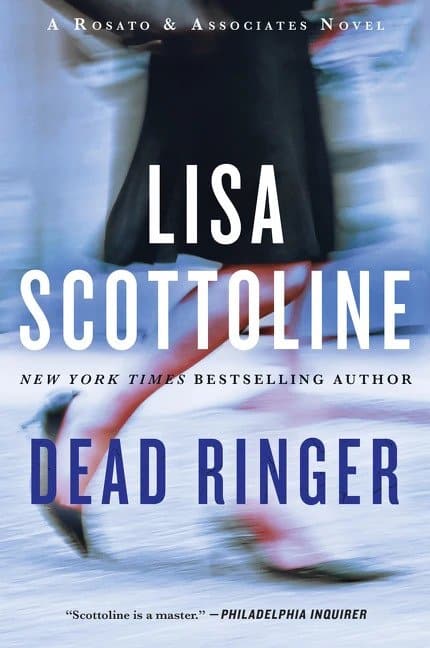
Dead Ringer
Rosato & Associates, Book #8
On Sale Now!
“Scottoline fans and first-time readers will love this tale of dueling twins.”
– Cosmopolitan Magazine,”Hot Summer Picks”
“A smart, witty storyteller.”
– Philadelphia Magazine
“Action packed….[The] plot twists are dead-on.”
– Chicago Tribune
“Dead Ringer is as carefully proportioned as a well-made sonnet. All of the…threads are eventually woven into a pattern as elegant as [a] silk tie.”
– Philadelphia Inquirer
About the Book
A #5 New York Times hardcover bestseller and a #3 Los Angeles Times bestseller, Dead Ringer is fast, fun, and utterly compelling. There was lots of early buzz for Dead Ringer, and in fact, it went on to be chosen as a Costco book club pick, a Cosmopolitan Magazine “Hot Summer Pick,” a Literary Guild and Mystery Guild main selection, a Doubleday Book Club, Book of the Month Club and Quality Paperback Book Club alternate selection and an Audio Book Club featured selection. In Dead Ringer, the tough-as-nails head of Rosato & Associates, Bennie Rosato, has had her eye focused firmly on the bottom line, and takes a professional risk, charging into a class action lawsuit that could make-or-break her career. Just when she is at her most vulnerable, strange things begin to happen. It begins with a missing wallet, but events quickly escalate. Someone is posing as the outspoken, attorney and is wreaking havoc around town, apparently determined to destroy everything Bennie loves. And Bennie knows only one person can pull off this double deception, her identical sister, Alice Connelly. It’s been two years since Bennie has seen or heard from her troublesome twin, but she seems to be back with a vengeance. Bennie refuses to be anyone’s victim-least of all her own blood. When a brutal murder occurs, however, Bennie realizes that the stakes have turned deadlier than she feared. And the face of evil is identical to her own.
Read an Excerpt
Dead Ringer
By Lisa Scottoline
CHAPTER 1
Bennie Rosato had waited for more than a hundred jury verdicts in her career, but the waiting never got easier. The courtroom was empty, the air still. Bennie could hear the clock ticking on the paneled wall, but it could have been her sense of drama. She was sitting next to her client, Ray Finalil, who was gnawing his cuticles. If they lost this trial, Ray’s company would have to pay three million dollars in damages. Three million bucks buys a lot of cuticles.
Bennie set aside her own case of nerves to cheer him up. “Yo, Ray. How do you stop a lawyer from drowning?”
“How?”
“Take your foot off his head.”
Ray didn’t smile. His gaze remained fixed on the vacant jury box, with its black leather chairs swiveled in different directions. The jury had been charged on the law this morning and they’d been out deliberating all day. That meant Ray and Bennie were entering their sixth hour of small talk. To Bennie, that was as good as married.
“Okay, no more jokes,” she said. “Tell me about your son’s baseball game. I’ll pretend I don’t know about the home run or the catch at third base.”
“Second base.”
“See?”
Ray’s chin dropped to his hand. His brown eyes were bloodshot from three weeks of sleepless nights, and his cheeks hollow from the ten pounds he’d shed during the trial, even though he was completely innocent. Being a defendant was no-win; if you lost, you paid the plaintiff, and if you won, you paid your lawyer. This was known as the American Rule. Only Americans tolerate law without justice.
“Look, Ray, we don’t have to stay here. I have my cell phone, and the deputy clerk has my number. How about we take a field trip? We can go see the Liberty Bell. It’s only a block away.”
“No.”
“This land is your land, Ray. This land is my land.”
“No.”
“Come on, it’ll do you good to go out and walk around.” Bennie rose, stretched, and took a personal inventory. She thought she was good-looking for a lawyer, even though she stood six feet tall and her proportions were positively Amazonian. Her khaki suit was still pressed and her white Gap shirt fairly clean. Her long, disobedient blond hair had piled into a twist with a tortoiseshell barrette, but no make-up maximized the blue of her eyes or minimized the crow’s feet their corners. An old boyfriend had told her that her mouth was generous, but she suspected it was a sneaky way of saying she had a big mouth. At the moment, it was shaped into a sympathetic frown. “You don’t wanna take a walk?”
“When do you think they’ll come back?” Ray didn’t have to explain who “they” were. The jury.
“End of today.” Bennie sat back down. At least the stretch had shaken off some of her stress. She couldn’t remember the last time she’d exercised. This trial had consumed every available minute for the past two months, but her law firm needed the dough. The slump in the economy had hit lawyers, too, and people had stopped suing each other. Could world peace be far behind?
“I can’t take another day of this. You sure, they’ll come back today?”
“Positive. This is a simple fraud case, in federal court only through the miracle of diversity jurisdiction. And Thursday is a good day for a juries to go out. If they come back today, they get it over with. Then they go home and make it a three-day weekend. They won’t go to work on a Friday after jury duty.”
“How do you know?”
“Trial wisdom. The elders pass it down in a secret ceremony. We call it the bar exam to fool gringos like you.”
“But what are they doing in there for so long?” Ray rubbed his forehead with leftover fingernails. He looked older than his fifty-one years, and oddly, he’d become more nervous as the trial wore on, not less. Ray wasn’t a lover or a fighter. He was an accountant.
“A day is nothing. We just had a fifteen-day trial with one hundred twenty-six exhibits and twenty-eight witnesses. You want them back sooner?” Bennie pointed to the empty jury box. “Keep watching those chairs. It works every time.”
Suddenly, the paneled door next to the dais opened and the deputy clerk entered. He was tall and fit, and his polyester blazer made an officially swishy sound when he walked. When Bennie realized he was heading for her, she rose. “They back?” she asked, her heart beginning to thump, but the deputy clerk shook his head.
“They got a question. They sent a note. Court’s in session in five minutes. Plaintiff still in the attorney’s conference room?”
“Yes,” Bennie answered, and as soon as the deputy clerk took off down the aisle, Ray jumped to his feet and clutched her sleeve.
“What does he mean, a question? The jury has a question? What question?”
“Relax. Sit down.” Bennie unpeeled Ray’s fingers and eased him down into his chair. “The judge is coming out to read us the question. Then we – “
“A question? How typical is that? I don’t understand. What does he mean, a question?”
“It happens from time to time. The jury sends the judge a question, about the evidence or the law. It’s nothing to be – “
“I mean, what do they have to know?” Ray raked his free hand through his thinning hair. At the beginning of this trial he had looked like a Chia Pet. Okay, maybe that was an exaggeration. “Why do they get to ask questions?”
“Because this is America. Now stay cool. Curtain’s up.” Bennie gestured behind him, where the courtroom had come abruptly to life. The court reporter returned, cracking his knuckles before he took his seat straddling the stenography machine. The deputy clerk and a young female law clerk entered through the paneled door and bustled to their posts at the side and the front of the courtroom. The plaintiff and his lawyer hustled up the aisle and sat down at their counsel table, and the lawyer nodded, acknowledging Bennie.
Bennie nodded back, but that was as friendly as she ever got with opposing counsel, if you didn’t count giving them the finger behind her legal pad. She wasn’t trying to win friends, she was trying to win cases. Her loyalty remained with her client, even one as panicky as Ray. Especially one as panicky as Ray, who leaned over and started whispering so close she could smell lunch on his breath. Ray Finalil was the only person in the world still eating liverwurst and onions.
“What do you think they’ll ask? What could they not understand?”
“Quiet. Stand up.” Bennie rose as Judge William Delburton, a gray-haired Carter appointee who’d been tough if even-handed during the trial, swept into the courtroom. He sat in his high-backed leather chair on the paneled dais, underneath the thick golden seal of the United States Courts. In his hands rested a single piece of folded paper, which he studied as the deputy clerk said his lines.
“All rise!” cried the deputy clerk, needlessly. The parties were already on their feet and the gallery was empty. “Court is now in session, the Honorable Judge William Delburton presiding.”
“You may be seated,” the judge said. “Good afternoon, everyone.” He glanced at Bennie as she sat down, then at plaintiff’s counsel table. “Counsel, as you may have heard, our jury has a question. I’ll read it to you.”
Ray grabbed Bennie’s hand. She pretended not to notice. Litigation reduced men to little boys, and women to Gloria Allred.
Judge Delburton slipped on black reading glasses that matched his robe. “The question reads, “Judge Delburton, are we allowed to give the plaintiff more than the three million dollars he is asking for?”
Oh my God. Bennie’s mouth went dry. This couldn’t be happening. It was a runaway jury. Ray slumped in his seat like a crash-test dummy.
Judge Delburton gestured to plaintiff’s table. “Counsel, what is plaintiff’s position on the answer to this question?”
“Thank you, Your Honor.” Plaintiff’s counsel rose and couldn’t hide a giddy chuckle. “The answer to the question is yes. In addition to the three million dollars in compensatory damages, plaintiff is entitled to punitive damages. We put on substantial evidence of the invidious nature of the misconduct and fraud perpetrated by the defendant company and its owner, Mr. Finalil. An award in excess of the three million in damages is more than justified.”
“Thank you.” Judge Delburton slipped off his glasses and turned to Bennie. “Ms. Rosato, for the defense, your thoughts on this matter.”
“Thank you, Your Honor.” Bennie swallowed with difficulty and rose on weak knees. “The answer to the jury’s question should be no. The jury may not extend damages to a figure that plaintiff’s evidence does not factually support. The jury should be charged again and told that they are required to base their verdict on the evidence, not on anything else.”
“Thank you, Counsel.” Judge Delbourton slipped his glasses back on and placed the jurors’ note neatly on his desk. The document would be nice and flat for the appeal that would surely follow, either way. “I have your arguments, and I hold that we will answer the question in the affirmative.” The plaintiff did request punitive damages, so the jury may award damages in excess of the compensatory amount of three million. I will so instruct them.”
“Objection for the record,” Bennie said reflexively. She glanced over at Ray, who looked as if he were ready to hurl. The deputy clerk brought the jury back into the courtroom, and the judge answered their question and sent them out to deliberate again. Then the judge and his staff left the courtroom, and the plaintiff and his lawyer gloated down the aisle, and Bennie turned to Ray. But by now she had her bearings.
“Ray, don’t freak,” she said, but it was too late.
“How can I not? Didn’t you hear what they said?” Ray tore off his glasses and slapped a hand to his face, rubbing reddish streaks into his cheek “They’re gonna give him more than three million dollars!”
“No, that’s necessarily so. I admit this looks bad, but you never know with a jury question. They – “
“This is a disaster! Bennie. A disaster! How can they do this to me?”
“Ray, wait, calm down.” Bennie reached across counsel table for a gray plastic pitcher, shook a Styrofoam cup from the upside-down stack, and poured him some water. “Please listen to me. We don’t know where that question came from and we don’t know what it means. It’s not necessarily a question the whole jury has, and it most likely isn’t. Somebody could have a stray hair. It happens²”
“But the question!” Ray gulped water and some splashed over the rim. “Didn’t you hear the question? What am I gonna do? This is unreal! This is a catastrophe!” “Ray, listen.
“I don’t think the plaintiff proved their case. You didn’t think so, either, remember? We thought they lost, and nothing has changed except for the jury question. So my opinion remains the same.” Bennie looked directly into his stricken eyes, which were peering over the Styrofoam like Kilroy. “Scharf was a lousy witness, remember? He was angry on the stand, not sympathetic, and angry plaintiffs never win. Remember my Angry Plaintiff Theory?”
“No.”
“Yes, you do.” Bennie leaned over. “Ray, look. I’ve seen this before. Everybody goes crazy when the jury asks a question. Everybody tries to read the tea leaves. People run and scatter. Don’t lose your head.”
“But they asked the question!”
“Forget the question. We don’t know what it means and we can’t do anything about it. Our defense went in very nicely. You were a great witness, and so were Jake and Marty. We’re in the right. We told the truth. So stay the course.”
“The course is what got me here! The course is gonna kill me! Ray set down the cup, spilling water on the table. “Shouldn’t I settle?”
“They wanted a five hundred grand last time we asked, and you didn’t have it. You knock over a gas station since then?”
Bennie didn’t wait for an answer. “And I’m sure their demand just went up. So we have no choice but to wait.”
“But it’s like waiting to get hit by a train! I’m tied to the tracks here!”
“Wait, and stay calm.”
“Easy for you to say!” Ray exploded, his voice echoing in the empty courtroom. His eyes flashed with sudden anger. “If I lose, you won’t have to pay a dime! You just go on to the next case! You’re a typical fucking lawyer!”
Bennie felt stung. Silence fell between them. The clock on the wall ticked away. This time, she was sure of it. “We’re in this together, Ray,” she said, after a minute.
She didn’t expect him to believe it.
But it was true.
Only half an hour later, court was back in session, and the jury was entering the jury box. The jury foreman held a piece of white typing paper in his hand. It was the verdict sheet, which contained a single question and answer. The courtroom went completely quiet as everyone scrutinized the jurors, including Bennie. She noticed that they avoided eye contact with her, and she tried not to take it as a bad sign. She could hear Ray sucking wind. At least he wasn’t green anymore.
Judge Delburton was sitting in his black leather chair atop the dais, eyeing the jurors over his reading glasses. When they were resettled and looking at him, he addressed them. “Has the jury reached a verdict?”
“We have, Your Honor,” answered the foreman. He rose and handed the verdict sheet to the deputy clerk.
Bennie held her breath. Ray clenched his fists. The deputy clerk handed the verdict sheet to Judge Delburton, who opened and read it to himself, his expression impassive. Then he handed it back to the deputy clerk, who puffed out his chest, held the paper high, and read it aloud:
“Question: Do you find the defendant is liable to the plaintiff, and if so, what are his damages? Answer: We find the defendant not liable.”
Yes! Yes! Yes! Bennie felt like shouting for joy. They had won! She nodded toward the jury in gratitude, as Ray grabbed her hand and squeezed it hard. She looked over, and he’d burst into a broad grin, which didn’t let up even as the jurors were polled by a shocked plaintiff’s lawyer, answered “not liable” one by one, then were dismissed by the judge, who left the room with his staff, closing the door behind them.
“Congratulations!” Bennie shouted, when they were alone again, and Ray leapt into her arms. She gave him a heartfelt hug. She couldn’t remember the last time she’d felt so happy. Or so relieved. “We won, Ray! Thank God!”
“I won! I won!” Ray yelled, and when she broke their embrace, his eyes were welling up behind his glasses.
“Aw, it’s all over, Ray!” Bennie gave him another hug. She’d never seen a grown accountant cry. So what if he’d gotten a little jerky in the clutch? Served her right for telling lawyer jokes. “Enjoy it! We won!”
“I know, I can’t believe it.” Ray took off has glasses and squeezed his eyes with his thumb and index finger, trying to regain his composure. “You said I would, and I did.”
“I won’t even say I told you so.” Bennie clapped him on the back and picked up her briefcase and bag. “Come on, let’s go celebrate! Drinks on you!”
But when Ray removed his hands from his eyes and replaced his glasses, he still looked miserable. His forehead creased with anxiety, his eyes brimmed with tears, and his lower lip trembled.
“Ray, cheer up. We won. It’s all over.”
“It’s not that,” Ray cleared his throat and met her gaze with wet eyes. “I have something to tell you.”
“What?”
“I can’t pay.”
Bennie smiled. “I was only kidding, Ray. Drinks on me.”
“No, I mean, I can’t pay you.” Ray squared his narrow shoulders. “What I owe you. Your fee.”
Bennie blinked. “Sure you can.”
“No, I can’t. I feel terrible about this, but I can’t pay you. I don’t have the money.”
“Of course you do.” Bennie set down her briefcase and purse in bewilderment. “You’re a good client. You paid me last quarter. And the one before that. Your business is healthy.”
“Not really. I borrowed the money to pay you last quarter, and I thought I could pay you this quarter because my two biggest clients were going to pay me. But last month they told me they can’t, since their customers didn’t pay them.” Ray ran a tongue tip over dry lips. “They’re both filing for Chapter Eleven. In fact, I’m about to file myself.”
“You’re filing for bankruptcy?”
“Yes.”
Bennie’s mouth dropped open. “This can’t be!?”
“It is.”
“But you’re an accountant, for God’s sake! I mean, how could this happen?”
I’m a good accountant, a good businessman, but with this recession, it’s like a domino effect.”
“Ray, I’m counting on this fee.” Bennie had put in almost two hundred and fifty hours on this case this quarter, with trial preparation and trial. Even if she billed him fifty bucks an hour for her time, she was still cheaper than a plumber. “You owe me almost fifteen thousand dollars. I can’t absorb that kind of loss. I have a payroll to meet.”
“I can’t pay you, Bennie.”
“You can pay some, can’t you?”
“Not a penny. I’m sorry.”
“How about you pay in installments?” Bennie felt desperate. No wonder he’d been getting more nervous as the trial went on; he was facing bankruptcy. And now, so was she. “Listen, Ray, I can work with you. I’ll work with you.”
“No. My company is your client, not me. This is a corporate debt, and I can’t make side deals.” Ray shook his head. “When I put it into bankruptcy, you’ll have to get in line.”
“Am I first, at least?” “Frankly, you’re not even the first lawyer. My business lawyers take before you, and my tax guys.”
“But what about the experts we hired, for the trial? You have to pay them. I promised you’d pay them. I’m not allowed to, even if I had the money.”
“Sorry.”
Bennie reeled. She couldn’t process it fast enough. She was still feeling residually happy about the victory. She had won and lost in the same moment. She didn’t know what to say or do. There was no trial wisdom about this. Nobody wise ever let this happen. And Ray looked so stricken, she didn’t have the heart to kill him.
On autopilot, Bennie picked up her briefcase and bag. “I gotta get back to work,” she said.
But she was talking more to herself than to him.
2009© by Lisa Scottoline. All rights reserved.
Discussion Guide
Dead Ringer
Questions for Book Clubs
- Coming up with good titles is very hard for Lisa, but she thought that Dead Ringer was the perfect title for a book about twins. However, after the book was done, she found out her kid and her kid’s friends had never heard that expression. Did you understand the phrase? Can you think of a title that would have been better?
- In Dead Ringer, Alice does some really terrible things to Bennie to try to destroy her. In the process she even tries to hurt Bennie’s dog, Bear. Is someone who would hurt a dog unredeemable? Does Alice deserve a second chance? Does everyone deserve a second chance?
- Is Alice a sympathetic character? Do you feel sorry for Alice because she was the twin who was given away? Does this make Alice’s actions any more forgivable? Do you think Bennie’s mother made the right decision in giving away one twin?
- In Dead Ringer, David comes to Bennie and Bear’s rescue. Have you ever had a total stranger come to your rescue, just because they were a good person, and not because they were looking for something in return? Would you be able to willingly accept this kind of help, or would you be reluctant and suspicious?
- Alice is driven by both competitiveness and jealousy, which has led her to do some harmful, even horrific things. Some envy between siblings is normal, but where does it cross the line? Is it usually the parents’ fault when siblings are so envious of one another? Is there something parents can do to promote greater harmony between siblings?
- Bennie takes a huge risk by putting her house up as collateral to save her business. Was this a smart move? Would you have been able to take that kind of risk? Do you think she would have made a different decision if she had children? Do you think that you have to take risks in order to be successful?
- Bennie does forgive Alice, despite everything she had done. Is this because Bennie is just a good, forgiving person, or do you think she is partially motivated by the guilt of being the chosen twin? Could you forgive Alice? Do you think she can really change? Do we let family get away with things that we would never put up with from others, or are we harder on them?
- Would you like to read about Alice again?

